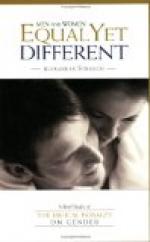Naomi, having such proof of her attachment to her, expostulated with her no further; and, disconsolate and weary, the poor women made their way to Naomi’s old home. During the absence of the family, the parcel of land which had been possessed by Elimelech had passed into the hands of strangers. Naomi naturally desired that it might be redeemed, as both herself and Ruth would be greatly benefited if it were. Boaz, though not the nearest kinsman, on being made acquainted with the circumstances of the case by Ruth, generously took up the cause; and the nearest of kin having relinquished his claim, he redeemed the property with it; and, with Ruth’s own free consent, took her to be his wife. Her individual concurrence is apparent throughout the whole transaction. No one had any right to sell at all, or otherwise to dispose of her, except by her own wish.
The rape of the Benjamites is sometimes referred to in terms expressive of the desire to cast opprobium upon the teachings of the Bible. Unfortunate as was the condition of the Benjamites on this occasion, they had no more sanction for what they did from the law of Moses, than had Ahab for destroying the prophets of the Lord. Neither was the order of the Jewish elders for the massacre of men and elderly women, and the saving of the four hundred young women to make up the deficiency of wives still existing in this tribe, in any sense chargeable to the Divine law.
We might with as much propriety hold the Gospel responsible for the Massacre of St. Bartholomew, as to hold the law of Moses responsible for the acts of the Israelites. The Mosaic precepts concerning adultery and divorce might at first sight appear to give more latitude to men than to women, and therefore to be partial; but when we accept the interpretation given by our Lord, the apparent partiality vanishes. The Savior’s testimony on the subject is very explicit. Matthew xix, 3-10, we read: “The Pharisees also came to him, tempting him, and saying unto him, Is it lawful for a man to put away his wife for every cause? And he answered and said unto them, Have ye not read, that he which made them at the beginning made them male and female, and said, For this cause shall a man leave father and mother, and shall cleave to his wife: and they twain shall be one flesh? Wherefore they are no more twain, but one flesh. What therefore God hath joined together, let not man put asunder. They say unto him, Why did Moses then command to give a writing of divorcement, and to put her away? He saith unto them, Moses because of the hardness of your hearts suffered you to put away your wives: but from the beginning it was not so. And I say unto you, Whosoever shall put away his wife, except it be for fornication, and shall marry another, committeth adultery: and whoso marrieth her which is put away doth commit adultery.”
That in this matter of divorce Christ recognized the right of women to be equal to that of men, is apparent from Mark x, 2-12, the eleventh and twelfth verses of which we here quote:




